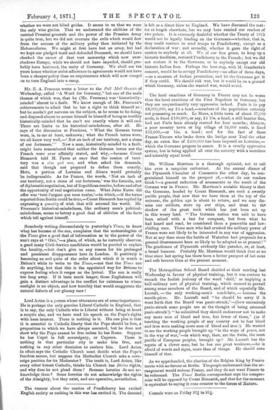Mr. E. A. Freeman wrote a letter to the Pall
Mall Gazette of Wednesday, called "A Word for Germany," but one of the main themes of which was, that he (Mr. Freeman) was historically- minded' almost to a fault. We know enough of Mr. Freeman's achievements to admit that he has a right to think himself so ; but he needn't get nervous on the subject, as he seems to be doing, -and disposed almost to accuse himself to himself of being so terribly historically-minded that he can't see exactly where it will end. There are limits to his historical-mindedness, after all. He says of the discussion at Ferrieres, " What the German terms were, is, to me at least, unknown ; what the French terms were, we all know very well,—' Not an inch of our territory, not a stone -of our fortresses.' " Now a man, historically-minded to a fault, might have remembered that neither the German terms nor the French were ever officially stated, and why,—because Count Biamarck told M. Fevre at once that the cession of terri- tory was a °sine qua non, and when asked his demands, -said that though not prepared to define them exactly, Metz, a portion of Lorraine and Alsace would probably be indispensable. As for France, the words, ' Not an inch of our territory, not a stone of our fortresses,' was the formula, not of diplomatic negotiation, but of Republican resolve, before and after the opportunity of real negotiation came. What Jules Fevre did -offer was 'tout l'argent Tie vous voulez,'—to which,—if the terms Nreported from Berlin could be true,— Count Bismarck has replied by expressing a quantity of wish that will astound the world. Mr. Freeman's historical-mindedness, like ordinary men's political- 'mindedness, seems to betray a good deal of oblivion of the facts which tell against himself.






























 Previous page
Previous page